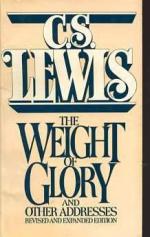
|
| Name: _________________________ | Period: ___________________ |
This test consists of 5 multiple choice questions, 5 short answer questions, and 10 short essay questions.
Multiple Choice Questions
1. When discussing heaven, Lewis states that he does not believe his desire for Paradise proves what?
(a) That it exists.
(b) That others cannot achieve it.
(c) That God exists.
(d) That he will enjoy it.
2. In "Why I am Not a Pacifist" Lewis says that were he to be a Pacifist, he would go against the writings of all but which of the following?
(a) Plato.
(b) Aristotle.
(c) Cicero.
(d) Gandhi.
3. Lewis says in "The Weight of Glory" that heaven is, by definition, what?
(a) A mythical place.
(b) The opposite of hell.
(c) What we hope to attain.
(d) Outside our experience.
4. According to Lewis in his discussion of Pacifism, what sort of society tolerates Pacifists?
(a) Conservative.
(b) Religious.
(c) Liberal.
(d) Anarchist.
5. Why, in "Transposition", does Lewis say he wishes to discuss the phenomenon of speaking in tongues?
(a) It is a stumbling block for him.
(b) His audience requested it.
(c) It is essential to understanding Pentecost.
(d) He has important insight to share.
Short Answer Questions
1. Lewis states that we are half-hearted creatures because, when offered infinite joy, we fool around with all but which of the following instead?
2. Which analogy does Lewis use when discussing the seeming pointlessness of continuing education during a war?
3. When discussing mental exercises to defend the scholar against war, what does Lewis give as the first enemy?
4. While talking about duty in wartime, Lewis says that God's claim on us is which of the following?
5. What, according to "Transposition", is the relationship between the spiritual and the natural?
Short Essay Questions
1. Discuss Lewis's response in "The Weight of Glory" when talking about Wordsworth's definition of beauty in life.
2. Explain the five promises of Scripture as discussed in "The Weight of Glory".
3. Why does Lewis believe that the fact that war makes death real to us is a good thing, as discussed in "Learning in War-time"?
4. While discussing the relationship between emotion and sensation, what three points does Lewis make about the relationship?
5. Explain Lewis's statement in the discussion of war that a man may have to die for his country but that no man must live for his country.
6. In "Transposition", what points does Lewis make about the included quote from Pepys?
7. According to Lewis in "Why I am Not a Pacifist", what is the main difference between reason and conscience?
8. In his discussion of authority in "Why I am Not a Pacifist", what does Lewis say has been society's conclusion about Pacifism?
9. What three ways does Lewis say there are to interpret the command to turn the other cheek, as discussed in "Why I am Not a Pacifist"?
10. Describe the two meanings of conscience as discussed in "Why I am Not a Pacifist".
|
This section contains 1,285 words (approx. 5 pages at 300 words per page) |

|




